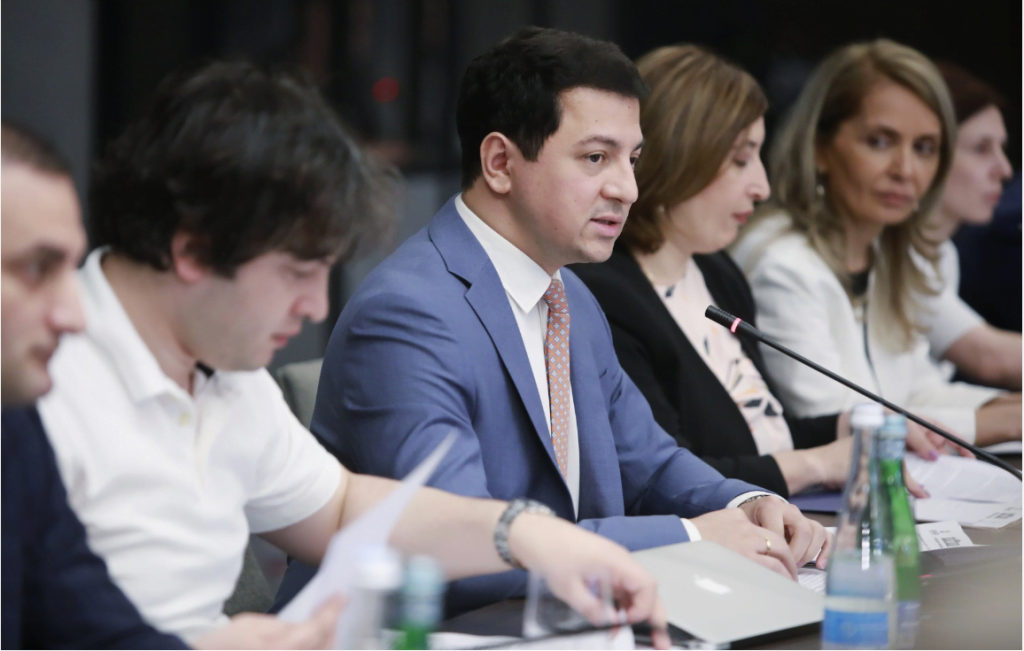The Parliament Chairman, Archil Talakvadze met with representatives of civil society organizations, opposition parties and international organizations today and acquainted them with the amendments developed by the ruling Georgian Dream party to improve the electoral legislation.
The amendments are planned to a number of laws, including the Election Code and the Law on Political Unions of Citizens, also envisaging the fulfillment of recommendations released by OSCE/ODIHR in its final report following the 2018 presidential elections.
Among the electoral reform priorities, Talakvadze focused on the following issues:
- The party financing system will be changed and a party that secures at least one mandate in the Parliament will receive financing according to the votes garnered.
- A party that enters the Parliament and that has a different gender candidate per three members on the list will again receive a 30% extra payment.
- Free airtime will be equally distributed among political parties. At the same time, a party will not be eligible to transfer its airtime to other party. Participation in TV debates will also be equally available.
- The Central Election Commission, as well as District Election Commissions and Precinct Election Commissions will again be composed of 13 members; however, the opposition will have the majority of members from a seven-member mandatory quota of political parties.
- Oversight and control over campaign financing will be more effective, transparent and less bureaucratic;
- Signatures of 5, 000 supporters will be needed for a political party to undergo registration for the 2020 elections.
- People using wheelchairs will be able to select a suitable for them precinct no later than six days before elections and each election district commission will have an obligation to have at least two wheelchair-accessible precincts.
- The rule of verifying the validity of ballot papers will be regulated and a ballot paper will be annulled if none or more than one electoral subject is marked.
Speaking about the amendments, Parliament Chairman Archil Talakvadze also focused on the ruling party-initiated constitutional amendments, envisaging holding of fully proportional elections in 2020.
“We want to open the political system for participation to ensure that politics in Georgia is democratic, more balanced and calm, also to reduce polarization and provide more space for cooperation and business-like discussion,” he noted.
Archil Talakvadze also explained that the Georgian Dream has “political will and readiness” for implementing this “important political reform,” adding that these amendments “will need opposition’s support and sharing responsibility by them.”
Opposition’s assessments
The opposition has strongly criticized the amendments initiated by the Georgian Dream party.
Levan Bezhashvili of the United National Movement said that legislative amendments proposed by the ruling party “will further aggravate the electoral environment” in the country.
“The electoral legislation is being amended under Georgian Dream’s dictatorship and naturally, it will not improve already worsened electoral environment,” he told reporters.
MP Otar Kakhidze of European Georgia said that there are many issues, which need further discussions. “The main message we have to the public is that Ivanishvili’s government is foredoomed, but we should make it move to opposition through peaceful, democratic elections,” he said.
The first meeting of the group working on electoral reform that is composed of the representatives of the ruling team, opposition parties, civil society and international organizations was held on June 13.
On June 24, Bidzina Ivanishvili, the chairman of the ruling party, announced that upcoming parliamentary elections in 2020 will be fully proportional with zero threshold. Ivanishvili’s announcement followed a four-day protest in Georgia, triggered by the Russian delegation’s presence at a session of the Inter-parliamentary Assembly on Orthodoxy in the parliament’s plenary chamber on June 20.
The Georgian Dream initiated relevant constitutional amendments in the Parliament on July 1.
This post is also available in: ქართული (Georgian) Русский (Russian)

